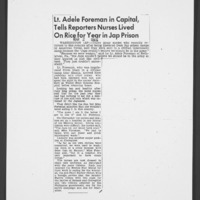Lt. Adele Foreman in Capital, Tells Reporters Nurses Lived On Rice for Year in Jap Prison
Item
-
Title
-
Lt. Adele Foreman in Capital, Tells Reporters Nurses Lived On Rice for Year in Jap Prison
-
Date Created
-
1945-03-02
-
Creator
-
The Bethlehem globe-times. (Bethlehem, Pa.) 1925-1977
-
Identifier
-
ww2-4044
-
Description
-
Clipping extracted from The Bethlehem globe-times pertaining to WWII military personnel from the Lehigh Valley, part of the BAPL WWII Newspaper Clipping Collection.
-
Digital Format
-
application/pdf
-
Clipping
-
Language
-
English
-
Publisher
-
Bethlehem Area Public Library
-
Contributor
-
Entries added in 2013 funded in part with Federal Library Services and Technology Act (LSTA) funds from the Institute of Museum and Library Services, administered by the Office of Commonwealth Libraries.
-
Date Submitted
-
2013-04-01
-
Type
-
Text
-
content
-
March 02, 1945
Lt. Adele Foreman in Capital, Tells Reporters Nurses Lived On Rice for Year in Jap Prison
WASHINGTON (AP) – Three Army nurses who recently returned to this country after being liberated from Jap prison camps by American forces, said they were sent to a civilian internment camp because the “Japs couldn’t believe we should be in the army.”
“Because we were women,” said 1st Lt. Adele Foreman of Bethlehem, Pa., “the Japs couldn’t believe we should be in the army so they treated us just like civilians. They just couldn’t understand.”
Lt. Foreman, who was imprisoned three years in a civilian camp near Manila, arrived here yesterday with other nurses who had been liberated with her, and spent the night in the nurses’ dormitory at Walter Reed General Hospital before returning home.
Looking tan and healthy after their long ordeal, the three nurses said that for the past year they had had nothing to eat by a mixture of rice and corn which was rationed by the Japanese.
They didn’t like the rice, but Miss Foreman admitted she wouldn’t mind eating it in this country.
“The more I ate it the better I got to like it” said Lt. Foreman.
On Corregidor the nurses and doctors set up a hospital in one lateral of the Malinta tunnel. Living conditions were difficult, the nurses said. “The Japs hit our water tank once,” said Miss Foreman. “We had to bathe with salt water and drink chlorinated water.”
Laundry was another major problem at Corregidor.
“As far as our own clothes were concerned, we were used to washing them in a creek because we’d done that on Bataan,” Miss Foreman said, “but in a hospital it’s very important to have clean things.”
The nurses are now dressed in clean new uniforms, all decorated with the same ribbons. Each has received the Bronze Star Medal for their work in caring for the wounded, the pre-Pearl Harbor ribbon with a foreign service star, the Asiatic-Pacific ribbon with two stars for the battles of Bataan and Corregidor and two ribbons awarded by the Philippine government, one for the entire campaign and one for liberation.
